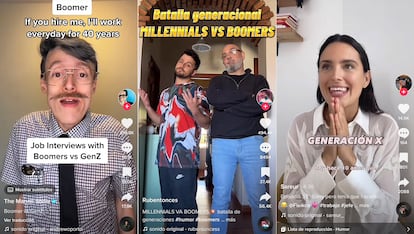Millennials against boomers: How humor on TikTok reinforces intergenerational conflict
According to a new study, the content published on the short video platform reinforces negative stereotypes against older adults

Each generation is characterized by something, and social media constantly reminds us of that. While millennials have a perfect command of technology, their parents need maximum screen brightness and make their application icons as large as possible. Some millennials have traveled around the world before they have turned 30, while their parents owned a house before that age. It’s the new versus the old, but also the new against the even newer, such as the centennials, the youngest of the cataloged generations. The differences between age groups is common fodder for memes on social media, especially on TikTok, the platform dominated by Gen Z, which gave rise to the popular expression, “OK, boomer.”
There are lots of jokes about these generational differences, but there are also many negative stereotypes that widen the generation gap on social media. According to a new study, in over half of the videos on these differences, “older adults were stereotyped by younger people as possessing values and beliefs at odds” with millennials.
“The results are overwhelming. We have found a clear trend towards ageism, and this is very worrying, since we know that this directly harms the mental health of those who suffer from ageism,” says Reuben Ng, a researcher at the University of Singapore and co-author of the study. After analyzing more than a thousand videos with the hashtags #Boomer and #OkBoomer, researchers identified a series of recurring negative stereotypes: older adults were depicted as being slow, incompetent with technology, holding outdated values and suffering from poor health. These stereotypes are problematic when it comes to bringing older adults into the world of social media.
@joincandor I will do everything in my power to not hop on a call 📵 #fyp #boomervsmillennial #relatable #corporatetok #hoponacall #socialanxietybelike #anxietyhumor #workhumor #officejokes #millennialproblems
♬ The Vibe With Ky Introvert Email - The Vibe With Ky
Although the term baby boomer has been used for more than half a century to identify the generation born after World War II, it was only in 2019 that it became considered an insult. That was when TikTok became inundated with videos of teenagers dismissing their parents’ sermons by saying, “OK, boomer.” The phrase captured millennials’ feelings towards a generation that they consider privileged, cut off from reality and, in some cases, even the cause of problems such as the decline of the economy and climate change.
“At the age of 20, I had already bought a piece of land,” a boomer tells a millennial in a TikTok video posted by Brandon Bryler, who is known for satirizing the generation gap. “Your land cost what a kilo of eggs costs today,” the young man replies. “Paying rent is a waste of money,” insists the adult. “Right? It’s not like we’re doing it because you bought all the houses and sell them at Ferrari prices,” replies the youngster, who gives up further arguing once his father asks him when he’s going to have a child.
@janellemcguinness I would love to buy your house… but how? #funny #funnyvideos #torontocomedy #boomer #genz
♬ original sound - Janelle McGuinness
The disconnect between the values and beliefs of the two generations is the most common stereotype on TikTok, according to the new study. Although most of the content is not ill-intentioned, that does not mean that it does not have a negative effect, regardless of whether the users are boomers or millennials. “When young people watch videos that ridicule ageism and demonize the habits of the elderly, this has an impact on their health. After all, we are all destined to grow old. Today’s millennials are tomorrow’s boomers,” Ng explains. On the other hand, if older adults do not find content that reflects their reality, they will continue to feel out of place on TikTok and avoid it, which in turn, furthers the generational conflict on the platform.
Using humor to question power
What both social groups understand as a sense of humor is key to deciphering the social media tensions between the different generations. “Currently, three forms of comedy culture coexist with one another. The oral medium, represented by jokes; the graphic, such as cartoons; and the digital, where the humor of this generation is inserted. What TikTok does is incorporate all these features and create transmedia humor, which on many occasions is not understood by [older] adults,” explains Carles Feixa, a social anthropologist at Pompeu Fabra University.
The older generation may understand the intent behind these videos, but not always. There is, in fact, a whole subcategory of TikTok videos in which youngsters are seen showing their confused mothers memes. “For them, it’s like learning a new language that is not their mother tongue. So sometimes they think that young people are insulting them, when all they are doing is expressing themselves,” says Feixa.
According to the expert, this gap in understanding hinders effective communication, which millennials see as an opportunity for humor. “Historically, it is a way of questioning power. The younger generations feel totally left out, they feel that all the political, economic and academic power is in the hands of the boomers. And since they cannot question it through other means, they use humor, and they do it on a site that belongs to them, such as TikTok,” he adds.
This does not mean that social media is the cause of the friction between different generations, says Mariano Sánchez, director of the Chair of Intergenerational Studies at the University of Granada in Spain. “Conflicts between generations have always existed. But they hide a misconception, since they start from the assumption that the categorization of generations is fixed, and it is not. We are all multigenerational, there is no one who can only be defined as a millennial, boomer or Gen Z,” he says.
In fact, reality is very different from the world that TikTok paints. “Studies and surveys carried out with representative samples show that the population does not perceive this conflict. Although it cannot be denied that there is frustration from the youngest, who feel different from the rest of the population. But this has always been the case, it is not limited to social media. The only thing that has changed is the spread and scope that the content has today,” concludes Sánchez.
Sign up for our weekly newsletter to get more English-language news coverage from EL PAÍS USA Edition
Tu suscripción se está usando en otro dispositivo
¿Quieres añadir otro usuario a tu suscripción?
Si continúas leyendo en este dispositivo, no se podrá leer en el otro.
FlechaTu suscripción se está usando en otro dispositivo y solo puedes acceder a EL PAÍS desde un dispositivo a la vez.
Si quieres compartir tu cuenta, cambia tu suscripción a la modalidad Premium, así podrás añadir otro usuario. Cada uno accederá con su propia cuenta de email, lo que os permitirá personalizar vuestra experiencia en EL PAÍS.
¿Tienes una suscripción de empresa? Accede aquí para contratar más cuentas.
En el caso de no saber quién está usando tu cuenta, te recomendamos cambiar tu contraseña aquí.
Si decides continuar compartiendo tu cuenta, este mensaje se mostrará en tu dispositivo y en el de la otra persona que está usando tu cuenta de forma indefinida, afectando a tu experiencia de lectura. Puedes consultar aquí los términos y condiciones de la suscripción digital.









































